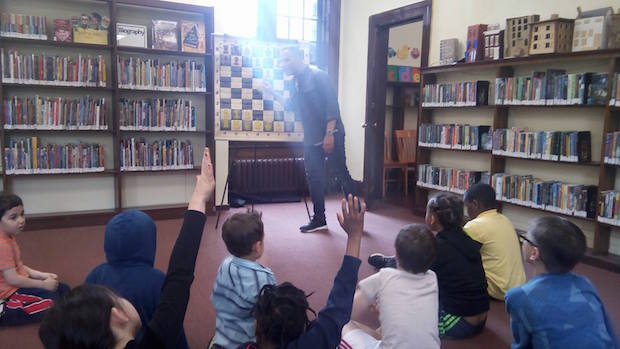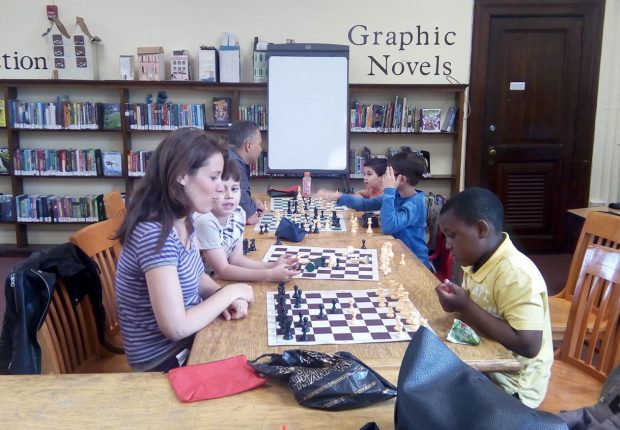Every Saturday afternoon the World Friends Chess club meets at the Hudson Park Library at 66 Leroy St., in the middle of the Village, and dedicates an entire hour to the game of chess, friendship and integration.
The players are all children: many of them come from the borough, others are members of refugee families that came to the United States, both recently or a few years ago. On average, the players are between 6 and 10 years old, but there is also 17-year old boy from Syria in the club.
Right before 4 p.m., I get to the library and I find about 10 kids sitting at the tables moving the white and black pieces on the chessboards. They’re very concentrated. “Checkmate!!!” someone shouts suddenly.
I introduce myself to one of the teachers who volunteers at the chess club and I learn that the entire club is based on volunteer work. Light Buggiani was the first one to propose the club. He was born in Rome, but he lived most of his life in New York, where his chess and math school is based. Educational Light School is formed by a group of educators who teach kids and teens in both New York’s public and private schools.

Light tells me how the chess adventure started: “Like me, many New Yorkers feel the need of helping the kids of the refugees, but often they don’t know how. How to connect the refugee families with the local communities? The game of chess allows us to break through this isolation. Slowly, through the many meetings, we managed to break the ice and friendships were born between the children and even the parents. Moreover, this initiative is very educational for New York kids: they understand that the world is bigger and more complex than New York City and that there are countries in which being ‘a kid’ can be very different and more difficult.”
Light explains that 60% of the children in the club are kids born in New York and 40% are refugees. The majority of the refugees are from Central America, fleeing countries like Nicaragua and El Salvador, where gang problem runs rampant. A second group is from West Africa and Haiti, while a third group is from Syria.
“A friend of mine who works at the United Nations put me in contact with an organization of refugees in New York, the Catholic Charities Community Services. The director accepted my project right away, and in just over a month we launched it. Thanks to Catholic Charities, I’m able to reach out to these families as well as the other four big organizations in New York that work with refugees. Though this network, we aim to broaden our pool of participants and propose the chess club in the outer boroughs, reaching children who have difficulties getting to the Village” Light tells me.
The World Friend Chess club provides subway tickets to the kids and their parents. The teachers speak different languages (English, Spanish, French and Arabic). On a voluntary basis, national chess champions like the famous Bruce Pandolfini, Maurice Ashley and David MacEnulty visit the club and teach “special” classes. A future project is to offer English lessons to adults, while their kids play chess. The goal is to bring about integration and favor the building of friendships among families that will also extend beyond the hour organized by the club.
I have the chance to talk to Gladys Valverde, a Mexican woman in her late 20s, raised in Jersey City and who now works at the Refugee Resettlement Department of the Catholic Charities Community Services. Gladys is a big fan of the chess club. “My association works above all with adults and teenagers, and so-called “unaccompanied minors,” boys and girls who come to the United States, crossing the borders alone, without their parents. We enthusiastically welcomed Light’s initiative, especially because it’s geared toward children.”
Gladys’s association works with about 500 refugees every year; some just arrived, others have been here for a couple of years and they have become, in part, New Yorkers. Both Gladys and Light refer to the danger of isolation and the fear that spread among the communities after the last presidential elections. “Rather than closing ourselves off, we should now be more open and develop a greater sense of community. The club was born out of this necessity,” states Light.

Now it’s time for the class to start. Light gathers all the kids, who sit down on the ground around a board representing the chessboard, with paper pieces that the teacher moves to explain to the students the strategical moves. It’s an interactive class and the kids compete to be the first one to suggest the better move to take the king down.
After the class, which is about 10 minutes long, the chess dances are open. “Do you want to play?” A. asks me. A.’s about 8 years old and comes from West Africa. “Of course,” I answer.
A group of kids gathers around us. They give advice, “move here!” they laugh, comment, someone moves a piece of mine to show me a move. I am amazed by the passion that these kids have when they’re playing chess. “You’re not very good” one of them tells me with a smirk. I smile too; how can I deny that chess is not really my strong suit? “There are a lot of kids that play chess here in New York,” Light tells me, as he watches amused as my black pieces are being eating one by one by A.’s white ones.
“Where are you from? – A. asks me. – You have a weird accent.”
“Italy,” I answer.
He looks at me without saying a word. I wonder what the word “Italy” means to him. Does he know where it is on the globe, compared to New York, compared to West Africa?
I smile and I think to myself how everyone of us has a story to tell, a different origin, a far-away culture. Today, however, we are all here at the chess club in the middle of the Village – without differences in age, nationality or religion – to play, to laugh, to challenge each other and to think about the world, our world, could be a really good place to live and to share.
Translated by Giulia Casati.











